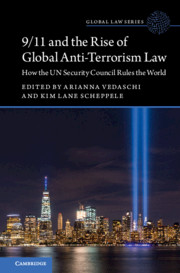Book contents
- 9/11 and the Rise of Global Anti-Terrorism Law
- Global Law Series
- 9/11 and the Rise of Global Anti-Terrorism Law
- Copyright page
- Contents
- Contributors
- Foreword
- Introduction
- Part I The Globalization of Anti-Terrorism Law: Theoretical Frameworks
- 1 A Proposal for a Kantian Definition of Terrorism
- 2 The Ever-Expanding Legislative Supremacy of the Security Council in Counterterrorism
- 3 Common Template, Diverse Agendas
- 4 Citizenship Deprivation and Cosmopolitanism
- 5 The Multilevel Governance of Emergency in Counterterrorism
- Part II Connecting the Global and the Local in Fighting Terrorism: Applications
- Appendix: The UN Security Council and the Rule of Law: The Role of the Security Council in Strengthening a Rules-Based International System
- Index
5 - The Multilevel Governance of Emergency in Counterterrorism
The “Globalization” of the Law of Exception?
from Part I - The Globalization of Anti-Terrorism Law: Theoretical Frameworks
Published online by Cambridge University Press: 01 July 2021
- 9/11 and the Rise of Global Anti-Terrorism Law
- Global Law Series
- 9/11 and the Rise of Global Anti-Terrorism Law
- Copyright page
- Contents
- Contributors
- Foreword
- Introduction
- Part I The Globalization of Anti-Terrorism Law: Theoretical Frameworks
- 1 A Proposal for a Kantian Definition of Terrorism
- 2 The Ever-Expanding Legislative Supremacy of the Security Council in Counterterrorism
- 3 Common Template, Diverse Agendas
- 4 Citizenship Deprivation and Cosmopolitanism
- 5 The Multilevel Governance of Emergency in Counterterrorism
- Part II Connecting the Global and the Local in Fighting Terrorism: Applications
- Appendix: The UN Security Council and the Rule of Law: The Role of the Security Council in Strengthening a Rules-Based International System
- Index
Summary
In exceptional circumstances, defined as “emergencies”, states can limit human rights and personal freedoms, as long as restrictions are proportionate and necessary. From a comparative constitutional law perspective, several “emergency models” can be envisaged. At the same time, several international law tools provide for the possibility to derogate guarantees embodied therein in order to tackle exceptional circumstances. Since September 11, 2001, international terrorism has represented one of the biggest challenges for democratic countries and such a “global” threat still afflicts our democracies. Nevertheless, few countries have triggered their emergency provisions, as contained either in national constitution or legislation. Rather, limitations of human rights are often embodied in “ordinary” measures, so posing a high risk of “normalizing” restrictions of rights outside of a legally regulated and temporary state of emergency. How far has the “normalization” of exceptional circumstances come in times of international terrorism in democratic systems? Which is the relationship between international law provisions allowing derogation from human rights embodied in treaties and national emergency provisions? How can the international level impact on the other levels in determining exceptional measures? Are several de facto emergency provisions challenging the above-described models, which classify emergency regimes from a constitutional law perspective?
Keywords
- Type
- Chapter
- Information
- 9/11 and the Rise of Global Anti-Terrorism LawHow the UN Security Council Rules the World, pp. 107 - 130Publisher: Cambridge University PressPrint publication year: 2021



